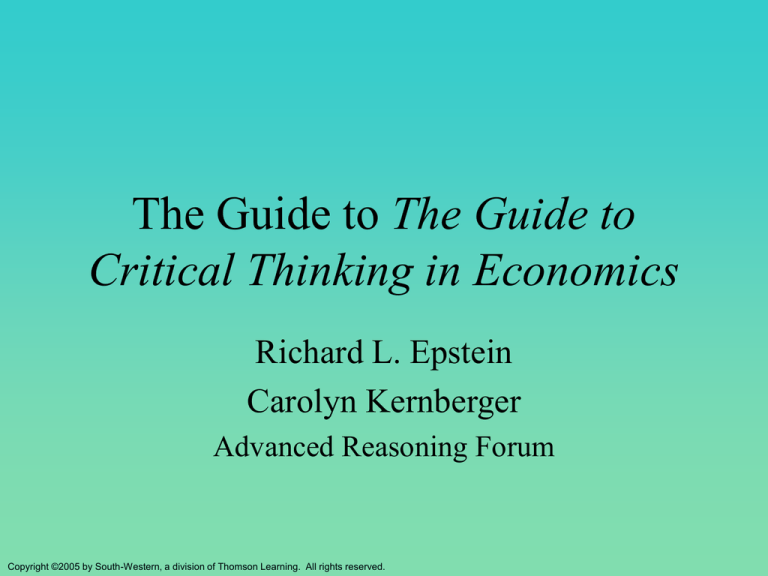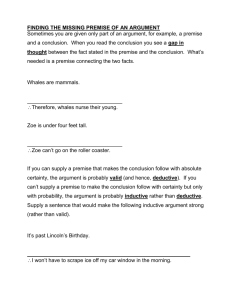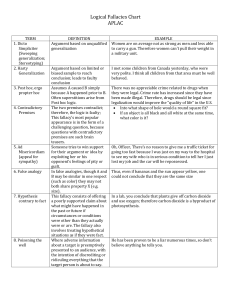
The Guide to The Guide to
Critical Thinking in Economics
Richard L. Epstein
Carolyn Kernberger
Advanced Reasoning Forum
Copyright ©2005 by South-Western, a division of Thomson Learning. All rights reserved.
Claims
A Claim is a declarative sentence used in such a
way that it is either true or false (but not both)
A Claim is subjective if whether it is true or false
depends on what someone (or something or some
group) thinks, believes, or feels. A subjective
claim invokes personal standards. Claims that are
not subjective are objective, and those use
impersonal standards.
Are the following claims objective or subjective?
Socialism is the most efficient way to ensure that all
members of a society are fed and clothed.
Subjectivist
Objective:
There’s
fallacy:
a lot
It’sofa disagreement
mistake to argue
about
thatthis.
But it’s still
because
there
objective,
is a lot ofassuming
disagreement
“efficient”
about has
whether
abeen
claim
clearly
is true,
defined.
it’s therefore subjective.
Investors in 1997 overwhelmingly preferred
no-load mutual funds.
This is a subjective claim: whether it is true or false
depends on what a group of people thought.
Definition
A Definition is an explanation or stipulation of
how to use a word or phrase.
A definition is not true or false, but good or bad, apt or
wrong. Definitions tell us what we’re talking about. Claims
are what we use to make assertions about that subject.
A Definition is not a Claim.
Steps in making a good definition
1. Show the need for the definition.
2. State the definition.
3. Make sure the words make sense.
4. Give examples where the definition applies.
5. Give examples where the definition does not
apply.
6. If necessary, contrast it with other likely
definitions.
7. Possibly revise your definition.
Does this fulfill the 7 steps listed for a good definition?
In the broadest sense, production is the act of increasing
one’s utility. Exchange of existing goods is productive
because, as we have seen, it increases one’s utility.
Production also can occur when the physical attributes of
resources—including their time of availability, place, or
form—are changed. We shall bow to convention and
restrict the label “production” to the changing or creating
of goods and services—that is, wealth.
Analysis: This is an example of a carefully made and
explained definition.
Slanter: A slanter is any choice of words that attempts to
convince by concealing a dubious claim
• Euphemism-temporarily misplaced inventory:
instead of stolen.
• Dyphemism- “Freedom fighters”—the guerillas
are good people fighting to liberate their country,
versus “Terrorists”—the guerillas are bad people,
inflicting violence on civilians for their own
partisan ends without popular support.
• Weaseler: I am truly sorry that it has taken so long
for you to understand what I have been saying.
For what
The speaker
did the speaker
just apologized
apologize?
that the audience
wasn’t smart enough to understand.
Arguments
An Argument is an attempt to convince someone
(possibly yourself) that a particular claim, called
the conclusion, is true. The rest of the argument is
a collection of claims called the premises, which
are given as the reasons for believing the
conclusion is true.
The conclusion is sometimes called the issue that
is being debated.
What are the claims in this argument?
The Standard and Poor’s index rose 4% today. Dick has
$2,000 in an S&P index mutual fund. So Dick’s mutual
fund account went up $80 today.
Premise 1: The S&P index rose 4% today
Premise 2: Dick has $2,000 in an S&P index mutual fund
Conclusion: Dick’s mutual fund account went up $80 today
IsAnalysis:
this a valid
argument?
This
is a valid: It’s impossible for
its premises to be true and conclusion false.
Whether it is good depends on whether its
premises are true.
What are the claims in this argument?
Señora Vez is an economics professor. All economics
professors are socialists. So Señora Vez is a socialist.
Premise 1: Señora Vez is an economics professor
Premise 2:All economics professors are socialists
Conclusion: Señora Vez is a socialist
IsAnalysis:
this a valid
argument?
This
is a valid argument: It is
impossible for the premises to be true and the
conclusion to be false. But it’s a bad argument
because the second premise is false.
The Guide to Repairing Arguments
Given an (implicit) argument that is apparently
defective, we are justified in adding a premise or
conclusion if it satisfies the following three conditions:
• The argument becomes stronger or valid
• The premise is plausible and would seem plausible to
the other person
• The premise is more plausible than the conclusion
If the argument is then valid or strong, yet one of the
original premises is false or dubious, we may delete that
premise if the argument remains valid or strong.
Can this argument be repaired?
It is only for the sake of profit that any man employs
capital in the support of industry; and he will always,
therefore, endeavor to employ it in the support of that
industry of which the produce is likely to be of greatest
value, or to exchange for the greatest quantity either of
money or of other goods.
Analysis:argument.
This argument is valid, but its
This is a cause/effect
single premise is false: Lots of other
Premise 1: Profit
alone drives
manwhere
to employ
capital
in
considerations
about
to invest
their
the support ofcapital
industry
matter to many people:
Conclusion: Capital
will always
used to maximize
convenience,
social be
responsibility…So
profit
there’s no way to repair it, and it’s bad.
Unrepairable Arguments
We can’t repair an argument if any one of the following
hold:
• There’s no argument here
• The argument is so lacking in coherence that there’s nothing
obvious to add.
• The premises it uses are false or dubious and cannot be
deleted.
• The obvious premise to add would make the argument weak.
• The obvious premise to add to make the argument strong or
valid is false.
• The conclusion is clearly false.
Here are a few more examples.
Try to analyze them on your own before
clicking to see the author’s analysis.
Identify slanters & evaluate argument.
Fair-employment laws impose burdens on some
employees. If a class of people want to work together,
they are forbidden to do so by the fair-employment
laws. If Armenians prefer to work with Armenians, or
Catholics with Catholics, or a Negro with Negroes, or a
Mormon with Mormons, these laws make that illegal,
for the employer would be susceptible to legal
prosecution for “discrimination.”
Analysis: This is not an argument, though it
What does may
placing
discrimination
seem
like one. It isinan explanation of the
quotation marks
tell youIt about
the to recognize when
first claim.
is important
author’s position?
someone is asking you to accept claims
without proof, which is common in textbooks.
What type of reasoning is this?
What is prudence in the conduct of every private family,
can scarce be folly in that of a great kingdom. If a foreign
country can supply us with a commodity cheaper than we
ourselves make it, better buy it of them with some part of
the produce of our own industry, employed in a way in
which we have some advantage.
Analysis:by
A analogy:
country isCountries
not like an
individual:
It may be
Reasoning
are
like
families
Is it a sound argument?
difficult for an individual to learn how to produce a
commodity more cheaply, but it might be easy for an
industry within a country to become much more efficient
with government protection. This does not show that
Smith’s conclusion is false, but that his analogy shouldn’t
convince you its true.
How many claims are present?
All criminals should be locked up forever, or we should put
more money into rehabilitating criminals, or we should
accept that our streets will never be safe, or we should have
a system for monitoring ex-convicts. We can’t lock up all
criminals forever, because it would be too expensive. We
definitely won’t accept that our streets will never be safe.
So either we should put more money into rehabilitating
criminals, or we should have some system for monitoring
ex-convicts.
Analysis: The first sentence is all one claim; it has
the form A or B or C or D. So the argument as
whole is valid: A or B or C or D; not A; not C;
therefore B or D. Whether its good or not depends
on whether the premises are plausible.
What is the author’s view on rent control?
Almost all economists believe that rent control adversely
affects the availability and quality of housing and is very
costly way of helping the most needy members of society.
Nonetheless, many city governments choose to ignore the
advice of economists and place ceilings on the rents that
landlords may charge their tenants.
Analysis: That “nonetheless”slips in a value
judgment
that citythe
governments
shouldn’t adopt a
What word
most reflects
author’s view?
policy that adversely affects availability and
quality of housing and is a costly way of helping
the most needy members of society. You may
agree, but you need to be aware that in doing so
you’re accepting a normative standard.
Is this a valid argument?
It’s real clear looking at the booms and busts in our
economy that they’re what swing elections. From 1983 to
1984 real GDP grew by nearly 7%, and that helped ensure
Ronald Reagan’s re-election. But from 1990 to 1991, real
GDP fell by 1%, which helped Bill Clinton defeat George
Bush.
Analysis: The first sentence here is a general
causal
“The be
growth
(decrease) of GDP is a
How could
thisclaim
argument
refuted?
Unless
“swings”
means no
more thata that
the
causal factor
in electing
(defeating)
presidential
purported
can be
a slightclaims
causal (helps=is
factor, wea
candidate.”cause
The two
particular
can
actually
theevidence
causal claim
by noting
causal
factor)refute
are no
for that,
only that
the
incumbentsince
Al Gore,
didnonot
soundly
defeat
illustrations,
there’s
reason
to think
George
W. Bush
2000
when
real GDP growth
they’re more
thaninpost
hoc
reasoning.
was very high.





